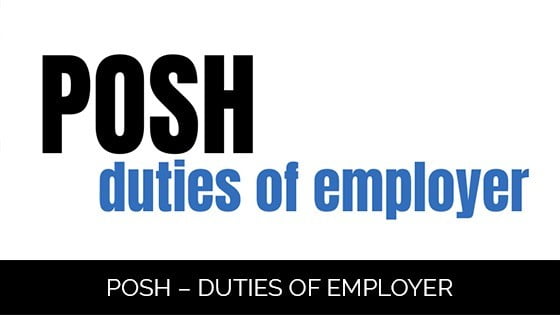The definition of ‘Employer’ as per Sexual Harassment of Women at Workplace (Prevention, Prohibition and Redressal) Act, 2013 is as follows:
The law defines an employer to mean any person responsible for the management, supervision and control of the workplace and management includes the person or board or committee responsible for formulation and administration of policies for such organisation.
The employer is duty-bound to initiate disciplinary action against the officer involved in sexual harassment, as it involves human dignity of women enshrined under Articles 14, 15 and 21 of the Constitution and the inquiry must be fair and reasonable.
As per the Sexual Harassment of Women at Workplace (Prevention, Prohibition and Redressal) Act, 2013, the role of the Employer is defined as below:
The law has provided for specific duties of the employer. The prime duty of an employer to set up an Internal Committee (IC) to ensure that aggrieved can file their complaints and seek redressal to such complaints. Also, to have a POSH policy in place. (Need to consider the applicability of the law while forming IC). Employers duties are as follows:
(a) Provide a safe working environment at the workplace with shall include safety from the persons coming into contact at the workplace;
(b) Display at any conspicuous place in the workplace, the penal consequences of sexual harassments; and the order constituting, the Internal Committee under sub-section (1) of section 4;
(c) Organise workshops and awareness programmes at regular intervals for sensitising the employees with the provisions of the Act and orientation programmes for the members of the Internal Committee in the manner as may be prescribed;
(d) Provide necessary facilities to the Internal Committee or the Local Committee, as the case may be, for dealing with the complaint and conducting an inquiry;
(e) Assist in securing the attendance of respondent and witnesses before the Internal Committee or the Local Committee, as the case may be;
(f) Make available such information to the Internal Committee or the Local Committee, as the case be, as it may require having regard to the complaint made under sub-section (1) of section 9;
(g) Provide assistance to the woman if she so chooses to file a complaint in relation to the offence under the Indian Penal Code (45 of 1860) or any other law for the time being in force;
(h) Cause to initiate action, under the Indian Penal Code (45 of 1860) or any other law for the time being in force, against the perpetrator, or if the aggrieved woman so desires, where the perpetrator is not an employee, in the workplace at which the incident of sexual harassment took place;
(i) Treat sexual harassment as a misconduct under the service rules and initiate action for such misconduct;
(j) Monitor the timely submission of reports by the Internal Committee.
Annual Report and the Consequences of Non- compliance:
The IC requires to prepare an annual report and submit the same to the employer and the District Officer. The calendar year is followed. Every year the employer has to include, in the annual report of the organization, the number of cases of sexual harassment filed and disposed of in a prescribed format. To get the format contact Protouch. The annual report consist of the following details:
1. No. of complaints received;
2. No. of complaints disposed of;
3. No. of cases pending for more than 90 days;
4. No. of workshops/awareness programmes carried out;
5. Nature of action taken by the employer/DO;
2. Law prescribes for penalty extending up to Rs. 50,000 if an employer does not comply with the law and penalty also includes cancellation of license to do business (in case of repeat offence).
Author: Dr. Aparna Sethi conducts insightful sessions on POSH, Women Leadership, Diversity, and Inclusion in the workplace. You can reach her on 8800003366/77. She has authored a book ‘ Where to Draw The Line – Complicated relationships at workplace’ which is completely focused on POSH. This book is available on Amazon. https://amzn.to/2Zl73WB







Leave a Reply